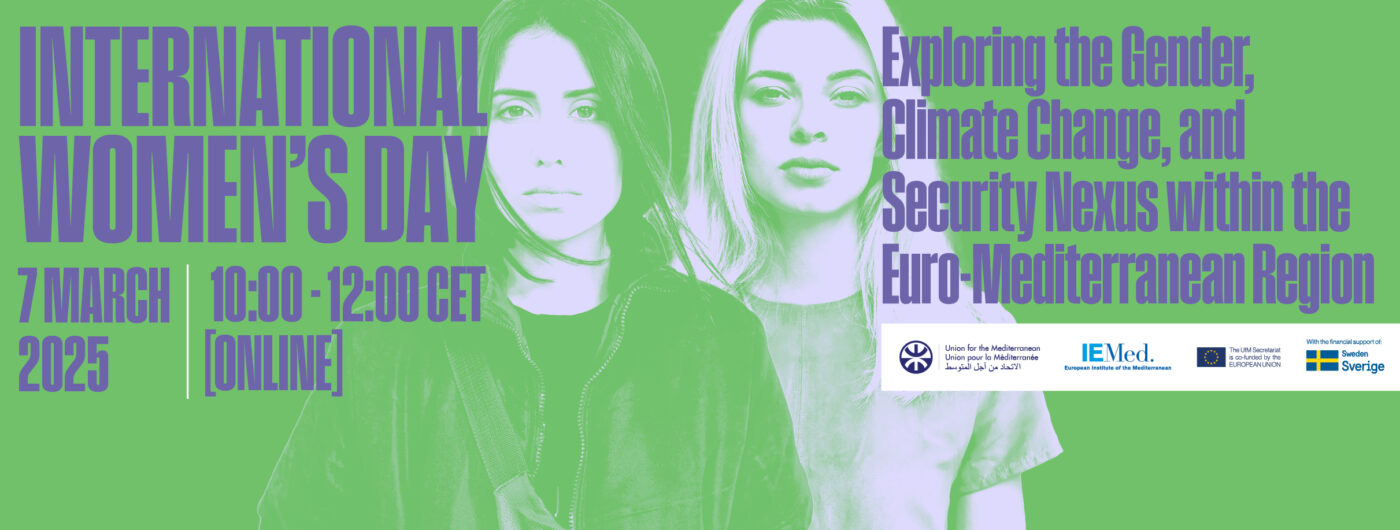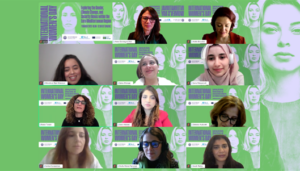
UfM stands with Euro-Mediterranean women in fight for gender equality and climate action on International Women’s Day
- The region is a climate change hotspot, the effects of which disproportionally impact women. Watch the UfM’s International Women’s Day webinar on gender, climate change and security, which explored how to capitalise on women’s potential to counter climate change and address its implications for peace and safety.
- Later this year the UfM will present the 2nd Progress Report on Gender Equality in the Euro-Mediterranean Region. With figures from the first-ever Intergovernmental Gender Monitoring Mechanism, it will provide policymakers with data-informed recommendations to close the gender gap in the region.
8 March 2025, Barcelona. As another International Women’s Day is marked, it is once again time to reiterate that gender equality in the Euro-Mediterranean region is yet to be achieved, despite signs of progress in countries on both shores of our shared sea. And in a region that is also warming at a rate 20% faster than the global average, climate change has time and again demonstrated its ability to exacerbate existing socioeconomic inequalities. Women, especially those in low income and rural communities, are disproportionately affected as they face increased instability and resource scarcity. This is a detriment to society as a whole given their centrality to fostering more inclusive and effective responses to the crisis.
 Because of this, the Union for the Mediterranean marks International Women’s Day with a webinar on the intersection of gender, climate change, and security. The online event served to present the latest UfM-European Institute of the Mediterranean (IEMed) policy paper, “Climate Crisis and Gender Equality in the Euro-Mediterranean Region – Emerging Security Risks.”
Because of this, the Union for the Mediterranean marks International Women’s Day with a webinar on the intersection of gender, climate change, and security. The online event served to present the latest UfM-European Institute of the Mediterranean (IEMed) policy paper, “Climate Crisis and Gender Equality in the Euro-Mediterranean Region – Emerging Security Risks.”
Speakers including Sarine Karajerjian from the Arab Reform Initiative think tank, Global Water Partnership – Mediterranean’s Anthi Brouma or Zeina Moneer, an environmental policy researcher with a PhD from Freiburg University, discussed how to advance the role of women in climate governance and peacebuilding.
“The many challenges women face in the Euro-Mediterranean region should be seized as opportunities to empower them as agents of change,” said UfM Deputy Secretary General for Social and Civil Affairs Stephen Borg.
“Women in our region have extraordinary capabilities, particularly when it comes to climate adaptation and peacebuilding initiatives, evidence of the critical role they play in society not as victims, but as much-needed leaders of change,” said UfM gender equality expert Anna Dorangricchia.
Empowering women as drivers of regional development and security is one of the UfM’s main pillars of action. Later this year, as the global community celebrates the 30th anniversary of the UN’s Beijing Declaration, the UfM will present the 2nd Progress Report on Gender Equality in the Euro-Mediterranean Region with findings from its Intergovernmental Gender Monitoring Mechanism, the first ever of its kind. Other initiatives that fall under this umbrella include the upcoming launch of the Mediterranean Network of Women Journalists or the Women Business Forum, an annual gathering that has already mobilised more than 150 female entrepreneurs and 10 financial actors.
Watch the webinar

